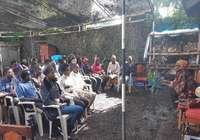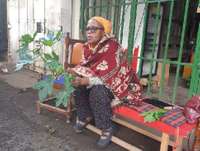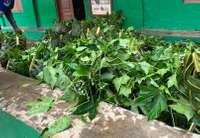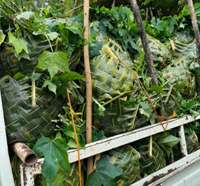
ECHO East Africa staff and interns were taught a new chaya recipe by Dr. Mwatima.
Dr. Mwatima Juma is the founder of the Practical Permaculture Institute of Zanzibar (PPIZ), which is based in Shakani, Mjini Magharibi B, Zanzibar and offers training to people from all over the world. The Center was founded in 2015. Dr. Mwatima visited the ECHO East Africa Impact Center in 2016 and was extremely impressed with the different efforts to promote best practices of sustainable integrated agricultural practices, particularly the promotion and use of perennial crops like chaya, which she enjoyed and took four cuttings for multiplication at her center. When she had the opportunity to attend a work-related meeting in the Arusha region, she visited ECHO center to learn more. On 25 April 2022 Dr. Mwatima visited ECHO once again and had the opportunity to explain how chaya functions well at its center and has come a long way as a perennial and popular vegetable. Dr. Mwatima claims that before COVID 19 pandemic, she used to sell significant amounts of chaya at tourist hotels, making between Tsh 800,000 and 1,000,000 Tanzanian shillings in a month. She and other colleagues at the center figured out how to locate a stable and reliable market option after COVID 19, so they came to an agreement to develop a WhatsApp group for diverse people living in the area where she works. She split the needy people into two groups: those who spoke English and those who spoke Swahili. People can place orders for chaya needs through these groups, and it will be delivered to their homes.

Chaya in the hands of Dr. Mwatima
As an employee of the IFAD organization some years back, Dr. Mwatima says she was able to travel in different parts of the world and see how the home delivery system worked in other nations. Using the resources available in Zanzibar, she worked out how to use the system. Chaya was placed in a "Pakacha," a type of sack constructed from the leaves of coconut tree branches. She has been delivering chaya veggies to customers once a week, the majority of whom live within 12 kilometers of the station. Every week at his center, they prepare "Swahili food," and one of the veggies cooked is chaya, which she says is quite popular with the center's customers.

Chaya is collected at the Practical Permaculture Institute of Zanzibar (PPIZ) at Shakani, Mjini Magharibi B, Zanzibar.
When she visited ECHO this month, she was able to teach ECHO staff and volunteers ideas for "bagia" cuisine that included chaya as a nutritious vegetable. Dr. Mwatima has advised everyone to be resourceful, as the resources we have can help us make significant improvements in our families and communities. She now owns 3 acres on which she grows a variety of vegetables, including Chaya, and her business is thriving.

Several "Pakacha" containing chaya ready for distribution to customers.
